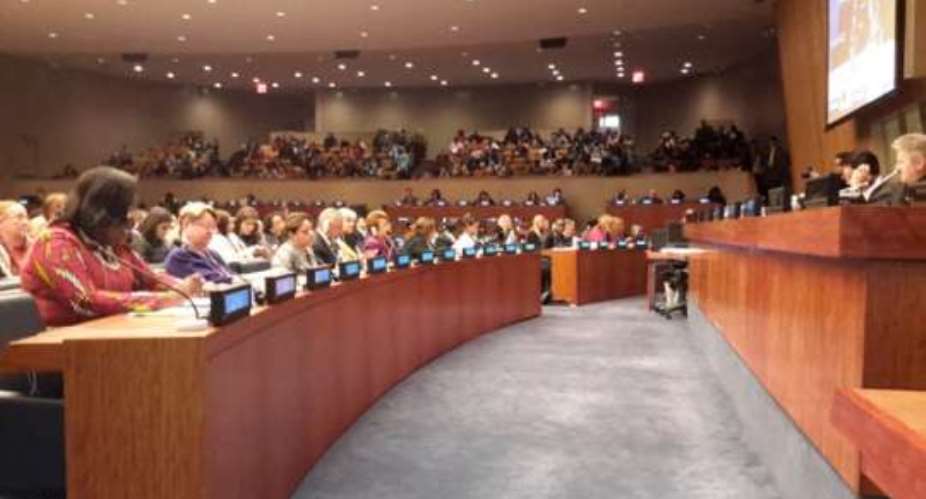(By Francis Ameyibor, GNA Special Correspondent, UN -New York)
New York, March 15, GNA - The United Nations Entity for Gender Equality and the Empowerment of Women (UN Women) has called for stronger collaboration between governments and gender-based groups for the realisation of the Sustainable Development Goals (SDGs).
It said: 'We know that in order to bring the new agenda to life, we need to get closest to those who are most disadvantaged. Governments cannot deliver alone on their strong commitments.
'Collaboration with civil society and women's organisations is key. It also means that greater support and protection of civil society is needed to ensure greater political space and capacity for them. To implement this Agenda, the support of the private sector is also needed.'
Phumzile Mlambo-Ngcuka, the UN Under-Secretary-General, who is also UN Women Executive Director, made the statements on behalf of the body at the on-going 60th Session of the United Nations Commission on the Status of Women (CSW60).
The SDGs, officially known as 'Transforming our world: the 2030 Agenda for Sustainable Development,' cover a broad range of sustainable development issues, including ending poverty and hunger; improving health and education; making cities more sustainable; combating climate change; and protecting oceans and forests.
Dr Mlambo-Ngcuka said: 'CSW60 has to be a positive moment...It has to be as positive as we were at the adoption of Agenda 2030 last year. That was arguably one of the finest moments for the UN and the global community, when all other differences were set aside, in the interests of all of humanity and for women and girls everywhere.
'What was agreed in the 2030 Agenda calls on us to change the way we live, do business, grow food, value motherhood, engage and protect girls and boys, communicate, and respect and recognise the rights of those different from the mainstream in their sexual orientation or in any other way.
'It is also important to recall that Agenda 2030 enhances, not replaces, the Beijing Platform for Action.'
She said Governments revalidated this Platform last year in September after adopting the SDGs, when more than 90 countries answered the UN Women's call for action to recommit and to 'Step It Up for Gender Equality'.
She stated: 'This is the moment to capitalize on all these positive commitments. It is a moment for all of us to 'Step it up' with Agenda 2030 plans that are decisive, implementable and transformative.
'UN Women had set up a youth wing of the CSW...'We recognise the need to include and engage the youth with greater seriousness and we have just launched our Youth and Gender Equality Strategy'.
Dr Mlambo-Ngcuka said there were 1.8 billion young people aged between 10 and 24 in the world - the largest youth population ever, and Agenda 2030 was largely about them and for them.
The CSW youth had called for the education about gender equality and the rights of women and girls to start in early childhood with formal, non-formal and informal education, she said.
Ahmad Alhendawi, the UN Secretary-General's Special Envoy on Youth said: 'We need to have a big leap to protect human rights and ensure gender equality.
'We are making some progress, but we are far from achieving gender equality. …. We have more goals than years to achieve them… There's no space here for baby steps'.
Ms Danielle Agyemang of the National Endowment for Democracy also said that: 'Everyone has something engaging and critical to bring to the table.
'There is the need for inclusiveness-making sure we are taking into consideration minority voices, just looking beyond the binaries of sexuality and gender.
'Those types of issues are central to the work that we ought to be doing here because none of this makes sense; none of this is worth it if we are leaving these key voices out'.
Representatives of Member States, UN entities, and the United Nations Economic and Social Council (ECOSOC) accredited non-governmental organisations from all regions of the world are attending CSW60 session, which ends on March 24.
Nana Oye Lithur, the Minister of Gender, Children and Social Protection is the leader of the Ghanaian delegation made up of Members of Parliament, representatives from the Ministries, Departments and Agencies (MDAs), Civil Society Organisations (CSOs), Non-Governmental Organisations (NGOs) and Gender Technocrats.
The CSW was established, in June 1946, as a mechanism to promote, report on and monitor issues relating to the political, economic, civil, social and educational rights of women.
It holds annual sessions in March to evaluate the progress made in protecting and enforcing the rights of women globally.
GNA





 Transport fares hike: GPRTU issue two-day ultimatum
Transport fares hike: GPRTU issue two-day ultimatum
 ARC endorses Alan as presidential candidate – Buaben Asamoa
ARC endorses Alan as presidential candidate – Buaben Asamoa
 Akufo-Addo appoints Kwasi Agyei as new Controller and Accountant-General
Akufo-Addo appoints Kwasi Agyei as new Controller and Accountant-General
 PNC dismiss reports of mass resignations
PNC dismiss reports of mass resignations
 PAC advocates for revenue collectors to be engaged on commission basis, not full...
PAC advocates for revenue collectors to be engaged on commission basis, not full...
 Akufo-Addo commissions Kumasi 1 Thermal Power Plant
Akufo-Addo commissions Kumasi 1 Thermal Power Plant
 Genser Energy commissions 110km of natural gas pipeline at Anwomaso
Genser Energy commissions 110km of natural gas pipeline at Anwomaso
 Naa Torshie calls for tolerance, peace ahead of 2024 election
Naa Torshie calls for tolerance, peace ahead of 2024 election
 Asantehene commends Matthew Opoku Prempeh for conceiving GENSER Kumasi Pipeline ...
Asantehene commends Matthew Opoku Prempeh for conceiving GENSER Kumasi Pipeline ...
 Let’s do away with ‘slash and burn politics’ in Ghana — Dr Adutwum
Let’s do away with ‘slash and burn politics’ in Ghana — Dr Adutwum
